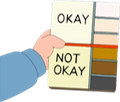Marhaba ![]() about 3 years ago I made a similar post and ended up teaching a comrade for almost 2 years, and I loved teaching my native tongue so I wanna go on that journey again, especially now that I have so much experience and already made the “course material”, it’s a fun “side hustle”.
about 3 years ago I made a similar post and ended up teaching a comrade for almost 2 years, and I loved teaching my native tongue so I wanna go on that journey again, especially now that I have so much experience and already made the “course material”, it’s a fun “side hustle”.
Ofc I make sure to adapt the lessons and study plan to the student’s interests and pace. I try to incorporate Comprehensible Input as much as possible even though it’s very scarce to find input made for learners. I think language learning has to be fun, engaging and things need to make sense, and believe me Arabic makes a lot of sense unlike English.
You can dm me from a throwaway account if you want. Let me know if you have any questions about Arabic or my approach to teaching. And dw about money, really!
And if there is enough interest we can have group lessons as well... just let me know if you're interested and we can try to make it work ت
Arabic is nowhere near as intimidating as you think, it actually has internal logic and consistency
I'm just gonna quote what @prolepylene said about his experience learning Arabic
Learning languages is hard, but I find it very rewarding. My lessons are fun, the language itself makes sense in a way that allows me to infer meanings and uses I don't explicitly know, and it teaches me about English almost as much as Arabic. Arabic as a language makes a lot more sense than English. A big part of it is that Arabic isn’t a bastard language of Germanic and Romantic influences, though the history of the Arabic world has left it with many loan words from the west. The other big thing is MSA (Modern Standara Arabic), though not really spoken colloquially, is actively managed to make it universal and easy to learn. In my opinion, the script is the least intimidating part of the language.
The [Arabic root system] is pretty great. At first I wasn’t sure how it was substantially different from the Latin root system, but comparatively to English the Arabic root system is everywhere throughout the language. As you learn the forms and patterns you can break down basically all verbs, nouns, adjectives, and adverbs to a base form and a pattern that you can use to infer meaning.
Hi, I am a linguist who studies how people learn languages. Duolingo isn't terrible, but there are better uses for your time.
Here are some reasons:
- it's basically just flash cards + gamification. Not terrible for rote memorization, but it's not the whole picture of learning a language.
- the sentences are decontextualized. Language is meant to be used in context, so ideally you want your language practice to happen within a conversation (or story--this is why I recommend the Duolingo Stories)
- the computer scientists who founded it didn't know that language acquisition was a field of research, despite there being world-class scholars at the same institution.
- Duolingo employs some linguists now. Some launder the reputation of the company by publishing research (mostly A/B design UX research on how to retain users).
- Many Duo linguists work on the Duolingo English Test (meant to replace the exams universities use for international students), which means their research is centered around assessment practices. Not on its face a bad thing, but this influences the kind of research done.
- other Duo linguists oversee the revolving door of underpaid contractors who produce content for their lessons. The company is currently working on AI to replace these workers.
- Alphabet owns them
As others in this thread have pointed out, it's also much better for Western languages with the Latin alphabet. Duo started with Spanish and French, and I've heard through contacts that work there, French is their archetypal/flagship course. The computer scientist-oriented solution for expanding to other languages is to assume typological similarity between languages, which means languages that are farther from French in grammar, writing system, etc. will all be contorted to fit the shape of their system.
My suggestions for anyone looking to learn a new language:
- practice rote memorization on your own, and prioritize communicating with others in authentic contexts.
- find a community of language learners to practice with. This can be formal classes or informal meetups, but keep each other accountable to using the language. You will all help each other improve.
- find a community of people who already speak the language. Practice with them as much as possible.
- focus as equally as possible on reading, writing, speaking, and listening skills. These are all different skills that synergize with each other but don't correlate 1:1 (i.e., being good at reading helps you get better at writing, but if you only practice reading, you aren't automatically improving your writing)
- do not be afraid to make mistakes. It's okay to use the wrong word, pronounce something weirdly, or use incorrect grammar. People make mistakes in their native languages all the time. You'll learn from the mistakes and get better in the future. The most important thing is putting the time in. Automaticity comes from practicing.
I could literally go on for days. Happy to answer specific questions anyone has.
I'm feeling 50% chance it's
 shit 50% chance just because its a normal shitty company and doesn't work
shit 50% chance just because its a normal shitty company and doesn't workedit: even natopedia has this very conspicuous
 Show
Show
So it kinda feels like theres not much evidence for its effectiveness and I bet the example data is a lot better for some languages than others...


Their move into AI generated lessons is a bit worrying IMHO
First time I hear of this shit, how do these tech companies manage to keep getting worse

Duolingo is a fine practice aid for Western European languages but most other languages are extremely underdeveloped. I've taken a stab at Duolingo Arabic and found it to be next to useless.
like in my experience there's a clear tier ranking.
- Spanish, French, Portuguese - you can learn the language pretty well, at least for reading, working exclusively with Duolingo.
- Mandarin - if you already know the language, or are learning it by other means, it can be a practice aid.
- Hindi, Arabic, Japanese - who tf is this even for?
Your odds are dramatically worse if it's in a non-Latin script.

Ive been using it- you’ll be very slow out the gate. I’ve had almost 100 days and it’s still on very basic phrases, like, still no verbs!. I’m using it as a warm-up before I dust off some of my old textbooks. It also doesn’t really teach the alphabet in a systematic way. What I do appreciate is the listening practice to differentiate the regular/ emphatic consonants which I find one of the more difficult parts of the language.
In addition to the reasons stated above, it’s also not ideal from a purely utilitarian point of view. Duolingo is very good at making you feel like you are learning a language, and gamifying that experience. If you watch people with 4 year streaks actually speak their target language it’s worryingly bad (in my experience). You would have gotten much further with other approaches.
My personal recommendation from learning French is to use Clozemaster for vocabulary and then as quickly as possible switch to emersion. Find simple books or tv shows that you can just about follow and increase complexity with skill.
Everyone learns languages in a different way so most importantly find something that works for you of course. But from learning German and French this was most effective for me.
ps: Yes I’m learning all the boring eurocentric languages but coming from The Netherlands they are simply the most useful for me.
You would have gotten much further with other approaches.
This is quite demoralizing.
Learners probably end up losing interest because of the very slow progress.
Hey Layla, that is very kind of you to say

Glad to hear you're still at it :)
Someone has to get these nerds to learn Arabic :)
There's two reasons i want to learn arabic: 1) the poetry is beautiful, and B ) I need to be able to joke with my Algerian coworker in private.
Arabic is a pretty language—and I’ve been into the Palestinian liberation movement longer than I’ve been a socialist.
And I wanna impress hot Arab chicks.
Learning a language will also give me something to do, and help me cultivate the image of being an enlightened dirtbag.
Everyone knows bilinguals are sexy, and Arabic is a sexy language.
I do, though english is not my native language but I should be okay learning through it.
Most name-brand language learning textbooks, in my experience, are based around "units" of vocabulary, usually with a certain theme for each unit. These are then awkwardly interspersed with grammar units.
And this method is terrible. People take the classes for 2 years, maybe they're good enough to do the homework and pass the tests but they're still rather useless. Even 3-4 years is scrapped almost as soon as the classes end.
The best way to start is to learn all the words/morphemes you need to make sentences and basic expressions of concepts. Conjunctions and common adverbs are not introduced until later in the conventional curriculum, but it's important to learn them early on, along with at least a few verb tenses, possessives, and other common morphemes. Once you get the first 2000 words down, then it makes sense to start doing thematic content.
Hey Sporg
 most Arabic learning textbooks suck which is why I never relied on one and decided to make the lessons myself.
most Arabic learning textbooks suck which is why I never relied on one and decided to make the lessons myself.
I want to learn a lot of languages. But I don't even keep up with the smattering of German and Spanish I stutter out.
It's those European languages' fault not yours
 You just need a cool teacher
You just need a cool teacher 

The language transfer app has a decent arab introduction course. And its free and open source software. Im already 15 lections in.
Am half Arab but never learnt Arabic and always wished I had :(
Hmmm, maybe... how are verb conjugations and tenses like in it? (I kinda know the alphabet, I suppose)
Arabic doesn't have irregular verbs and it has two main tenses, perfect (past) and imperfect (present and future). This is a bit of an oversimplification but I can delve deeper if you are interested.
Cool. I’ve been wanting to learn Arabic for a while.









